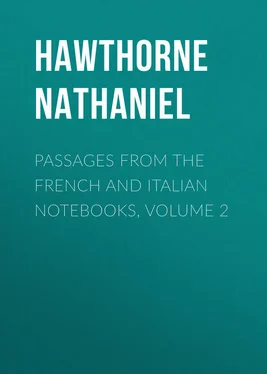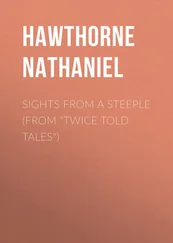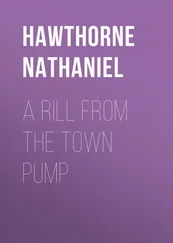Nathaniel Hawthorne - Passages from the French and Italian Notebooks, Volume 2
Здесь есть возможность читать онлайн «Nathaniel Hawthorne - Passages from the French and Italian Notebooks, Volume 2» — ознакомительный отрывок электронной книги совершенно бесплатно, а после прочтения отрывка купить полную версию. В некоторых случаях можно слушать аудио, скачать через торрент в формате fb2 и присутствует краткое содержание. Жанр: literature_19, foreign_antique, foreign_prose, на английском языке. Описание произведения, (предисловие) а так же отзывы посетителей доступны на портале библиотеки ЛибКат.
- Название:Passages from the French and Italian Notebooks, Volume 2
- Автор:
- Жанр:
- Год:неизвестен
- ISBN:нет данных
- Рейтинг книги:3 / 5. Голосов: 1
-
Избранное:Добавить в избранное
- Отзывы:
-
Ваша оценка:
- 60
- 1
- 2
- 3
- 4
- 5
Passages from the French and Italian Notebooks, Volume 2: краткое содержание, описание и аннотация
Предлагаем к чтению аннотацию, описание, краткое содержание или предисловие (зависит от того, что написал сам автор книги «Passages from the French and Italian Notebooks, Volume 2»). Если вы не нашли необходимую информацию о книге — напишите в комментариях, мы постараемся отыскать её.
Passages from the French and Italian Notebooks, Volume 2 — читать онлайн ознакомительный отрывок
Ниже представлен текст книги, разбитый по страницам. Система сохранения места последней прочитанной страницы, позволяет с удобством читать онлайн бесплатно книгу «Passages from the French and Italian Notebooks, Volume 2», без необходимости каждый раз заново искать на чём Вы остановились. Поставьте закладку, и сможете в любой момент перейти на страницу, на которой закончили чтение.
Интервал:
Закладка:
In the piazza adjoining the church is a statue of the first Cosmo, the old banker, in Roman costume, seated, and looking like a man fit to hold authority. No, I mistake; the statue is of John de' Medici, the father of Cosmo, and himself no banker, but a soldier.
June 21st. – Yesterday, after dinner, we went, with the two eldest children, to the Boboli Gardens… We entered by a gate, nearer to our house than that by the Pitti Palace, and found ourselves almost immediately among embowered walks of box and shrubbery, and little wildernesses of trees, with here and there a seat under an arbor, and a marble statue, gray with ancient weather-stains. The site of the garden is a very uneven surface, and the paths go upward and downward, and ascend, at their ultimate point, to a base of what appears to be a fortress, commanding the city. A good many of the Florentines were rambling about the gardens, like ourselves: little parties of school-boys; fathers and mothers, with their youthful progeny; young men in couples, looking closely into every female face; lovers, with a maid or two attendant on the young lady. All appeared to enjoy themselves, especially the children, dancing on the esplanades, or rolling down the slopes of the hills; and the loving pairs, whom it was rather embarrassing to come upon unexpectedly, sitting together on the stone seat of an arbor, with clasped hands, a passionate solemnity in the young man's face, and a downcast pleasure in the lady's. Policemen, in cocked hats and epaulets, cross-belts, and swords, were scattered about the grounds, but interfered with nobody, though they seemed to keep an eye on all. A sentinel stood in the hot sunshine, looking down over the garden from the ramparts of the fortress.
For my part, in this foreign country, I have no objection to policemen or any other minister of authority; though I remember, in America, I had an innate antipathy to constables, and always sided with the mob against law. This was very wrong and foolish, considering that I was one of the sovereigns; but a sovereign, or any number of sovereigns, or the twenty-millionth part of a sovereign, does not love to find himself, as an American must, included within the delegated authority of his own servants.
There is a sheet of water somewhere in the Boboli Gardens, inhabited by swans; but this we did not see. We found a smaller pond, however, set in marble, and surrounded by a parapet, and alive with a multitude of fish. There were minnows by the thousand, and a good many gold-fish; and J – , who had brought some bread to feed the swans, threw in handfuls of crumbs for the benefit of these finny people. They seemed to be accustomed to such courtesies on the part of visitors; and immediately the surface of the water was blackened, at the spot where each crumb fell, with shoals of minnows, thrusting one another even above the surface in their eagerness to snatch it. Within the depths of the pond, the yellowish-green water – its hue being precisely that of the Arno – would be reddened duskily with the larger bulk of two or three gold-fishes, who finally poked their great snouts up among the minnows, but generally missed the crumb. Beneath the circular margin of the pond, there are little arches, into the shelter of which the fish retire, when the noonday sun burns straight down into their dark waters. We went on through the garden-paths, shadowed quite across by the high walls of box, and reached an esplanade, whence we had a good view of Florence, with the bare brown ridges on the northern side of the Arno, and glimpses of the river itself, flowing like a street, between two rows of palaces. A great way off, too, we saw some of the cloud-like peaks of the Apennines, and, above them, the clouds into which the sun was descending, looking quite as substantial as the distant mountains. The city did not present a particularly splendid aspect, though its great Duomo was seen in the middle distance, sitting in its circle of little domes, with the tall campanile close by, and within one or two hundred yards of it, the high, cumbrous bulk of the Palazzo Vecchio, with its lofty, machicolated, and battlemented tower, very picturesque, yet looking exceedingly like a martin-box, on a pole. There were other domes and towers and spires, and here and there the distinct shape of an edifice; but the general picture was of a contiguity of red earthen roofs, filling a not very broad or extensive valley, among dry and ridgy hills, with a river-gleam lightening up the landscape a little. U – took out her pencil and tablets, and began to sketch the tower of the Palazzo Vecchio; in doing which, she immediately became an object of curiosity to some little boys and larger people, who failed not, under such pretences as taking a grasshopper off her dress, or no pretence at all, to come and look over her shoulder. There is a kind of familiarity among these Florentines, which is not meant to be discourteous, and ought to be taken in good part.
We continued to ramble through the gardens, in quest of a good spot from which to see the sunset, and at length found a stone bench, on the slope of a hill, whence the entire cloud and sun scenery was fully presented to us. At the foot of the hill were statues, and among them a Pegasus, with wings outspread; and, a little beyond, the garden-front of the Pitti Palace, which looks a little less like a state-prison here, than as it fronts the street. Girls and children, and young men and old, were taking their pleasure in our neighborhood; and, just before us, a lady stood talking with her maid. By and by, we discovered her to be Miss Howorth. There was a misty light, streaming down on the hither side of the ridge of hills, that was rather peculiar; but the most remarkable thing was the shape into which the clouds gathered themselves, after the disappearance of the sun. It was like a tree, with a broad and heavy mass of foliage, spreading high upward on the sky, and a dark and well-defined trunk, which rooted itself on the verge of the horizon.
This morning we went to the Pitti Palace. The air was very sultry, and the pavements, already heated with the sun, made the space between the buildings seem like a close room. The earth, I think, is too much stoned out of the streets of an Italian city, – paved, like those of Florence, quite across, with broad flagstones, to the line where the stones of the houses on each side are piled up. Thunder rumbled over our heads, however, and the clouds were so dark that we scarcely hoped to reach the palace without feeling the first drops of the shower. The air still darkened and darkened, so that by the time we arrived at the suite of picture-rooms the pictures seemed all to be changed to Rembrandts; the shadows as black as midnight, with only some highly illuminated portions gleaming out. The obscurity of the atmosphere made us sensible how splendid is the adornment of these saloons. For the gilded cornices shone out, as did the gilding of the arches and wreathed circles that divide the ceiling into compartments, within which the frescos are painted, and whence the figures looked dimly down, like gods out of a mysterious sky. The white marble sculptures also gleamed from their height, where winged cupids or cherubs gambolled aloft in bas-reliefs; or allegoric shapes reclined along the cornices, hardly noticed, when the daylight comes brightly into the window. On the walls, all the rich picture-frames glimmered in gold, as did the framework of the chairs, and the heavy gilded pedestals of the marble, alabaster, and mosaic tables. These are very magnificent saloons; and since I have begun to speak of their splendor, I may as well add that the doors are framed in polished, richly veined marble, and the walls hung with scarlet damask.
It was useless to try to see the pictures. All the artists engaged in copying laid aside their brushes; and we looked out into the square before the palace, where a mighty wind sprang up, and quickly raised a prodigious cloud of dust. It hid the opposite side of the street, and was carried, in a great dusky whirl, higher than the roofs of the houses, higher than the top of the Pitti Palace itself. The thunder muttered and grumbled, the lightning now and then flashed, and a few rain-drops pattered against the windows; but, for a long time, the shower held off. At last it came down in a stream, and lightened the air to such a degree that we could see some of the pictures, especially those of Rubens, and the illuminated parts of Salvator Rosa's, and, best of all, Titian's "Magdalen," the one with golden hair clustering round her naked body. The golden hair, indeed, seemed to throw out a glory of its own. This Magdalen is very coarse and sensual, with only an impudent assumption of penitence and religious sentiment, scarcely so deep as the eyelids; but it is a splendid picture, nevertheless, with those naked, lifelike arms, and the hands that press the rich locks about her, and so carefully permit those voluptuous breasts to be seen. She a penitent! She would shake off all pretence to it as easily as she would shake aside that clustering hair… Titian must have been a very good-for-nothing old man.
Читать дальшеИнтервал:
Закладка:
Похожие книги на «Passages from the French and Italian Notebooks, Volume 2»
Представляем Вашему вниманию похожие книги на «Passages from the French and Italian Notebooks, Volume 2» списком для выбора. Мы отобрали схожую по названию и смыслу литературу в надежде предоставить читателям больше вариантов отыскать новые, интересные, ещё непрочитанные произведения.
Обсуждение, отзывы о книге «Passages from the French and Italian Notebooks, Volume 2» и просто собственные мнения читателей. Оставьте ваши комментарии, напишите, что Вы думаете о произведении, его смысле или главных героях. Укажите что конкретно понравилось, а что нет, и почему Вы так считаете.












